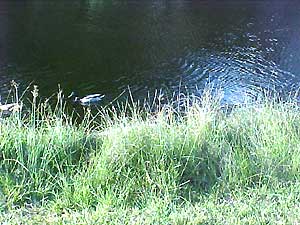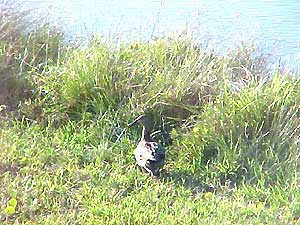Saturday, May 13, 2006
Discovery on a grassy bank
 We have waterfront property. Not like the rich and famous, but we are lucky enough to have a small pond at the back of our yard. We made the decision when we moved here that we would not fertilize or use pesticides on our lawn because we didn't want run off into the pond since there are fish and crabs that live there. Of course that was a pretty easy decision for us to make since we have never agreed with putting those things on a lawn to begin with, but that's another story.
We have waterfront property. Not like the rich and famous, but we are lucky enough to have a small pond at the back of our yard. We made the decision when we moved here that we would not fertilize or use pesticides on our lawn because we didn't want run off into the pond since there are fish and crabs that live there. Of course that was a pretty easy decision for us to make since we have never agreed with putting those things on a lawn to begin with, but that's another story.The other decision we made was to let the grass grow around the edge of the bank. Of approximately 15 homes facing the pond we are the only ones. Now to their credit, two of our neighbors have allowed cattails to grow and that provides some protection for birds and fish. Back to the reasons we allowed the grass to grow. It
- allows protection for birds and fish
- reduces silt in the pond
- provides a food source (insects) for the birds
- encourages wildflowers to grow and attracts butterflies and dragon flies and
- works as a semi-barrier for the dogs so they won't go down to the water to drink or swim and get sick from bacteria (which Duncan promptly did when we first moved in)
 We found a nest with what looks to be about 9 duck eggs in it. Doing some research, we learned that Mallards lay between 8-15 eggs at a time and they take approximately 28 days to hatch. We are now very careful about letting the dogs out without supervision. Max is a mother hen, so to speak, and likes to go over just to check on Mama and her brood every time he is in the yard.
We found a nest with what looks to be about 9 duck eggs in it. Doing some research, we learned that Mallards lay between 8-15 eggs at a time and they take approximately 28 days to hatch. We are now very careful about letting the dogs out without supervision. Max is a mother hen, so to speak, and likes to go over just to check on Mama and her brood every time he is in the yard.  He just can't understand that she really doesn't need his big nose sticking through the grass while she's trying to keep her eggs protected. Oh, that egg he wanted to show us? He was so gentle with it there was no damage. So, in a another week or so we're going to be something - maybe an aunt and uncle? How cool is that. Happy Gardening and we'll keep you posted on the progress of our little extended family.
He just can't understand that she really doesn't need his big nose sticking through the grass while she's trying to keep her eggs protected. Oh, that egg he wanted to show us? He was so gentle with it there was no damage. So, in a another week or so we're going to be something - maybe an aunt and uncle? How cool is that. Happy Gardening and we'll keep you posted on the progress of our little extended family.
Comments:
Post a Comment

This work is licensed under a Creative Commons License.
Thanks to Andrew Stenning who contributed the photograph for our masthead



